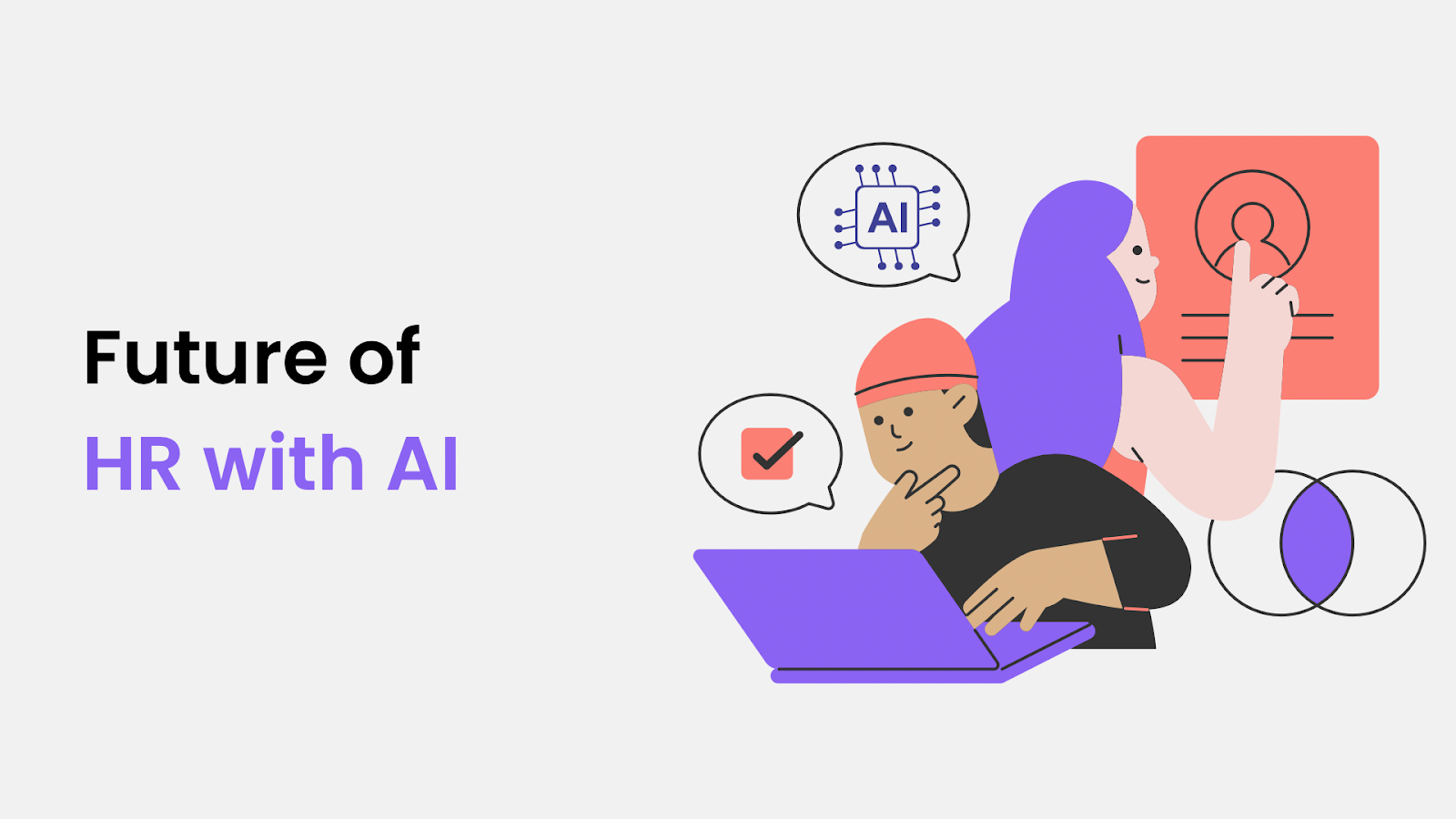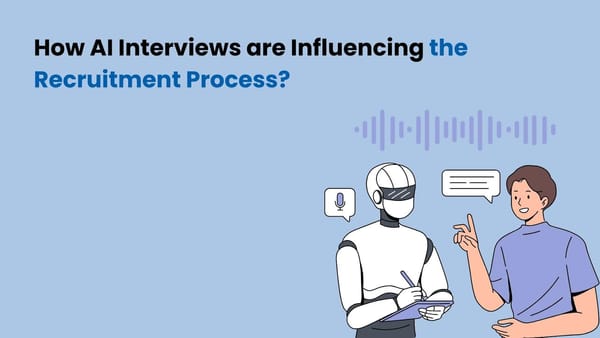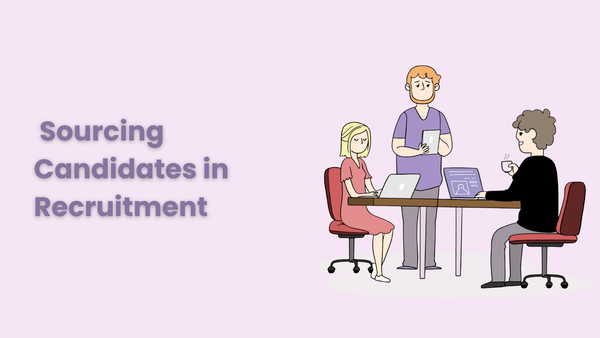Did you know that one in every three HR professionals uses AI to simplify their work?
AI frees you from repetitive tasks by efficiently handling tasks like sorting resumes, onboarding new employees, and managing employee performance. This means you can focus more on building strong teams and making better strategic decisions.
AI continues to improve HR departments by streamlining processes, saving time, and reducing manual workloads. This transformation leads to quicker decision-making, better outcomes, and a more efficient HR operation. By changing how HR functions, AI is expanding the possibilities of what's achievable when technology and people management come together.
In this blog, you’ll discover exactly how AI transforms HR, where it’s making the biggest impact, and the challenges you need to know. By the end, you’ll understand why more HR professionals choose to work with AI, not against it.
Let’s first read about the key applications of AI in HR
Key Applications of AI in HR
AI is transforming several key areas in HR, from hiring to employee retention. Here's how it's making a difference, with real-world examples:
AI in Recruitment and Hiring
- AI streamlines the hiring process, making it faster and more accurate.
- Scans resumes and identifies top candidates in seconds.
- Creates unbiased, inclusive job descriptions.
- Recommends competitive salaries based on market trends.
- Use Case: Unilever uses AI to screen resumes and conduct digital interviews. The system analyzes facial expressions, tone, and keywords to rank candidates, significantly reducing hiring time.
AI in Employee Engagement and Retention
- AI helps you keep employees engaged and reduces turnover risks.
- Monitors behavior and flags early signs of disengagement.
- Uses sentiment analysis to gauge employee morale through feedback.
- Provides real-time alerts to address retention risks quickly.
- Use Case: IBM uses AI to monitor real-time feedback, which has helped spot early signs of disengagement and tailor retention strategies effectively.
AI in Compliance and Risk Management
- Managing compliance and risk becomes simpler with AI.
- Automates audits and flags potential compliance issues early.
- Tracks adherence to labor laws and internal policies.
- Keeps compliance documentation organized and up to date.
- Use Case: Kount, now part of Equifax, uses advanced AI and machine learning to strengthen fraud detection and compliance management. Its platform provides real-time insights and helps businesses across industries prevent fraud, verify identities, and enhance operational efficiency
AI in Onboarding and Offboarding
- AI makes the transition into and out of a company smooth and efficient.
- Automates onboarding tasks like paperwork and policy reviews.
- Streamlines offboarding by handling exit interviews and access removal.
- Use Case: AIRBnB uses AI to deliver interactive, role-specific tutorials to new hires and leverages predictive analytics to foresee potential questions. For example, if a new engineer is focused on a particular dataset, the AI steps in, offering helpful documentation, recommended best practices, and even connecting them with internal experts for guidance.
AI in Employee Performance Management
- AI enhances performance tracking and employee development.
- Offers real-time insights into individual performance.
- Identifies skill gaps and suggests tailored training plans.
- Use Case: General Electric (GE) uses AI to track employee performance in real time, identify skill gaps, and offer personalized training programs to improve overall productivity.
With performance management covered, it’s time to dive into the broader benefits AI brings to HR as a whole.
Benefits of AI in HR
AI is now moving beyond its traditional role of task automation. It’s now reshaping how HR operates on a larger scale. Below are some of the key benefits that AI brings to HR departments.
- Efficiency and Time-Saving
AI takes over time-consuming tasks, allowing HR professionals to focus on higher-level responsibilities. According to PwC, by 2024, 54% of U.S. companies are using AI in some aspect of their operations, with many focusing on automating repetitive HR tasks. This includes AI-driven resume screening, interview scheduling, and onboarding processes, which dramatically reduce the time HR teams spend on these activities.
- Automated Resume Screening: AI scans resumes quickly, reducing the time spent manually reviewing each one.
- Task Automation: AI systems handle repetitive tasks like interview scheduling, employee queries, and performance reviews, freeing up hours for more strategic work.
Bernard Marr on Linkedin makes an excellent point,
“Generative AI frees up human HR professionals to focus their time on more complex or bigger-picture tasks”
- Enhanced Decision-Making Capabilities
AI’s data-driven approach improves the quality of decisions made in HR, ensuring more informed choices. In a recent Deloitte study, AI-enabled companies reported a highly possible threefold increase in market cap when aligning AI with their overall business strategy. With AI, you can make faster, smarter decisions based on real-time analytics and predictive insights.
- Real-Time Analytics: AI provides real-time insights into employee performance, helping you make quicker, smarter decisions.
- Predictive Hiring: AI-driven predictive analytics help you identify candidates most likely to succeed in your company based on data from previous hires.
- Reduction of Hiring Biases and Increased Diversity
AI can potentially reduce unconscious biases in hiring, creating a more inclusive workforce. With AI’s ability to focus purely on data and eliminate subjective decision-making, Hilton has successfully used AI to promote a bias-free recruitment process, significantly improving diversity in hiring.
- Bias-Free Screening: AI focuses purely on candidate data, eliminating biases often influencing hiring decisions.
- Diverse Talent Pools: AI systems can identify and recruit talent from underrepresented groups by expanding the reach of job postings and targeting a more diverse audience.
- Improved Employee Experience
By personalizing interactions and streamlining communication, AI helps improve overall employee satisfaction. AI-powered tools like chatbots enhance employee satisfaction by providing 24/7 support. According to Workday, 65% of organizations implementing AI have seen improvements in employee experience, including faster access to feedback and quicker resolutions to common employee issues .
- Chatbots for Employee Support: AI-powered chatbots answer employee questions 24/7, handling everything from benefits inquiries to training recommendations.
- Sentiment Analysis: AI tools analyze employee feedback in real time, helping you identify areas for improvement before they turn into larger issues.
- Scalability of HR Processes
AI helps HR departments scale their operations without proportionally increasing their workforce. Companies can leverage AI to manage performance across growing teams, ensuring that HR processes can scale seamlessly without overwhelming the HR department .
- Automated Onboarding: AI can guide new hires through onboarding, ensuring they complete all necessary steps, no matter how large your team grows.
- Performance Management: AI tools make it easier to manage performance data for growing teams, offering personalized feedback and development paths without overwhelming HR staff.
While AI has made HR processes faster, it also presents challenges that require thoughtful consideration and action. Let’s read about them next.
Challenges of AI in HR
While AI has made HR processes faster, it also presents challenges that require thoughtful consideration and action. Let’s break down these challenges and how you can tackle them effectively.
- Data Privacy and Security Concerns
AI systems handle vast amounts of personal and sensitive data, which makes the risk of data breaches or misuse a serious concern. AI often processes employee performance, health, and communication data, making strong data protection policies essential.
Pro Tip: Ensure compliance with privacy regulations and conduct regular security audits.
- Addressing Bias and Ensuring Fairness
AI systems are only as fair as the data they’re trained on. If the training data is biased, the AI can unintentionally replicate and amplify these biases, leading to unfair recruitment, promotion, or evaluation outcomes.
Pro Tip: Use diverse datasets and regularly audit AI systems for bias.
- Ethical and Legal Considerations
Using AI in hiring or promotions brings ethical questions to the forefront. Moreover, the legal framework around AI in HR is still evolving, so staying compliant can be tricky.
Pro Tip: Establish ethical guidelines and stay updated with AI regulations.
- Balancing AI and Human Expertise
AI can process and analyze data at lightning speed, but it lacks the human touch. Emotional intelligence, empathy, and context are essential in HR, and humans can only provide those elements.
Pro Tip: Use AI to assist, but keep human judgment central to decision-making.
- Employee Privacy Issues
Many AI systems monitor employee behavior and performance, which can feel invasive and raise concerns about employee privacy. Over-monitoring can also create distrust and a negative work environment.
Pro Tip: Be transparent about data usage and give employees control.
It’s not all bad with AI. Top companies today have AI tools in place to handle key functions. Let’s take a look at the most popular tools and how are they being used.
AI Tools and Technologies in HR
AI is changing how HR teams operate, and several tools and technologies are now at the forefront of this transformation. These tools can help streamline HR processes, offer data-driven insights, and create a more efficient, responsive department. Let’s dive into some key technologies shaping HR today.
- Chatbots and Virtual Assistants
AI-powered chatbots have become indispensable in HR. They handle repetitive tasks such as answering employee questions, scheduling meetings, or assisting with onboarding processes. Virtual assistants can provide 24/7 support, making them invaluable for global companies or those with large employee bases.
By implementing chatbots, HR teams can focus on more strategic tasks, allowing AI to manage the everyday routine questions that consume so much time.
- Predictive Analytics for Talent Management
Predictive analytics use AI to analyze current and historical employee data to predict future trends, such as which employees are likely to leave or which candidates are the best fit for a particular role. These insights allow HR to be more proactive in managing talent.
Predictive analytics enable HR to move from a reactive to a proactive approach in talent management, improving retention rates and workforce planning.
- Machine Learning in Performance Evaluations
Machine learning (ML) is transforming performance evaluations. It can process vast amounts of data, including colleague feedback, productivity metrics, and engagement scores, to provide a more objective and comprehensive performance review.
This enhances the fairness and accuracy of performance evaluations and helps in employee growth and retention by identifying specific areas for development.
- Outbound Hiring and Talent Nurturing with AI
AI-driven outbound hiring tools change how companies identify and engage with passive candidates. Tidyhire, for instance, leverages AI to automate the entire outbound hiring process. Their AI assistant, Ria, manages candidate sourcing, outreach, and follow-ups across multiple platforms like LinkedIn, Email, and WhatsApp. This speeds up talent acquisition and helps businesses engage with top talent faster, cutting hiring times and expanding the candidate pool.
- Use Case Example: Tidyhire’s AI system helps companies maintain engagement with candidates, ensuring potential hires stay interested throughout the recruitment process. By combining AI-driven outreach with human oversight, Tidyhire has helped reduce recruiting times by a third for many clients.
For companies looking to enhance their outbound recruitment, Tidyhire provides an AI solution that balances automation with personalized candidate interaction, ensuring a broader and more diverse talent pool. Book a Call.
- Natural Language Processing (NLP) in Employee Feedback
NLP allows AI to understand and interpret human language, making it ideal for analyzing employee feedback from surveys and reviews. By processing large amounts of unstructured data, NLP can highlight patterns, sentiments, and key areas of concern.
- Use Case Example: Workday Peakon Employee Voice leverages NLP to analyze real-time employee feedback, identifying trends in employee satisfaction, engagement, and areas of concern. This allows HR to immediately address issues, improving employee experience and retention.
With NLP, HR teams can quickly turn vast amounts of feedback into actionable insights, ensuring that employees’ concerns are addressed promptly and efficiently.
Next, let’s take a closer look at some of the companies who have successfully implemented AI and benefited from it.
AI Implementation in HR: Case Studies
Many of the world’s leading companies are embracing AI in their HR processes, seeing measurable benefits from enhanced recruitment to improved employee retention. Below are some examples of how AI is improving HR functions in major companies:
- Unilever
Unilever transformed its hiring process by using AI-powered video interviews for graduate candidates. The AI evaluates facial expressions, body language, and word choice, comparing them to traits of past successful hires. This automated system has saved Unilever around 100,000 hours in interview time and approximately $1 million annually, while also improving workforce diversity. Candidates have the choice to opt out of automated decision-making, enhancing both efficiency and the overall candidate experience.
- Amazon
Amazon uses AI and machine learning to enhance its hiring process, focusing on fairness and scalability. By implementing AI-driven assessments, Amazon has streamlined candidate evaluations and improved diverse hiring practices. These tools ensure that job applicants are better suited to roles, while Amazon continuously monitors the system to reduce bias. This approach has led to more equitable and efficient outcomes across the board.
- Delta Airlines
Delta Airlines has significantly enhanced its recruitment experience by integrating AI-based storytelling into the hiring process. Through video interviews, candidates can share their experiences, while the AI assesses key traits like motivation and problem-solving skills. Delta’s candidate-centric approach, which includes the option to re-record responses, has raised their net promoter score by 7 points and enabled the evaluation of 300,000 applications for 1,000 flight attendant positions every four months.
- Siemens
Siemens has adopted an AI-driven platform to focus on matching candidates based on specific skills, which streamlines the recruitment process and reduces manual workload. The AI analyzes resumes and translates them into skillsets, highlighting top candidates who might otherwise be overlooked. This innovation has allowed Siemens to handle over three million applications annually, improving time-to-hire and promoting diversity through hidden sociodemographic analysis.
- Procter & Gamble
Procter & Gamble revamped its recruitment approach by introducing an AI-powered virtual job tryout. This immersive simulation mimics a typical workday, requiring candidates to respond to emails, handle data, and solve workplace challenges. As a result, P&G reduced their time-to-hire by two months and created a more relevant, fair, and transparent assessment process, improving the overall candidate experience and reducing bias.
If you are a growing stage company and want to get the best talent out there. You should consider Tidyhire to amplify your outbound hiring efforts without any learning curve.
Stories inspired you enough? Let’s strategize how you can use AI, too.
Strategies for Successful AI Integration in HR
Implementing AI in HR isn’t as simple as flipping a switch—it requires thoughtful planning, collaboration, and clear guidelines. Let’s explore strategies for ensuring successful AI integration in your HR processes.
- Establish Clear Governance and Ethical Guidelines
AI's potential brings with it significant ethical considerations. It's crucial to establish a governance framework that ensures responsible AI usage. This includes setting transparency, fairness, and data privacy guidelines to prevent unintended bias and unethical practices.
- Develop Employee Skills for AI Adoption
To maximize AI's effectiveness, HR professionals must be upskilled to understand and work alongside AI tools. Training sessions on how AI can be utilized in HR processes will help employees transition smoothly into a more AI-driven environment.
- Ensure Transparency and Fairness in AI Algorithms
Transparency is key when using AI, particularly in recruitment and employee evaluations. It’s essential to ensure that employees understand how AI tools make decisions.
- Collaborate Between AI and HR Professionals
HR departments must work hand-in-hand with data scientists and IT professionals to implement AI solutions effectively. This collaboration ensures that the right tools are selected and deployed efficiently.
AI is HR is growing and will continue to do so. Let’s wrap it up with a quick look at the future.
Conclusion: The Future of AI in HR
AI in HR is a huge technological leap. As an HR professional, you’re no longer bogged down by endless paperwork or manual processes. Instead, you’re on the frontlines, armed with tools that help you make smarter, faster decisions. But remember, AI isn’t about replacing the human element but amplifying it.
AI allows you to streamline recruitment, retain top talent, and create personalized employee experiences. Integrating it thoughtfully is key to success—balancing data-driven insights with the human touch. Because at the end of the day, HR is still about people, and AI is just another tool to help you connect with them better.
As we move forward, the companies that successfully combine AI with their HR strategies will be the ones that stay ahead. So why wait? Embrace AI now, and lead your organization into the future.
Tools like Tidyhire are already transforming outbound hiring by combining the best of AI with human insight. Book a Call Now.



